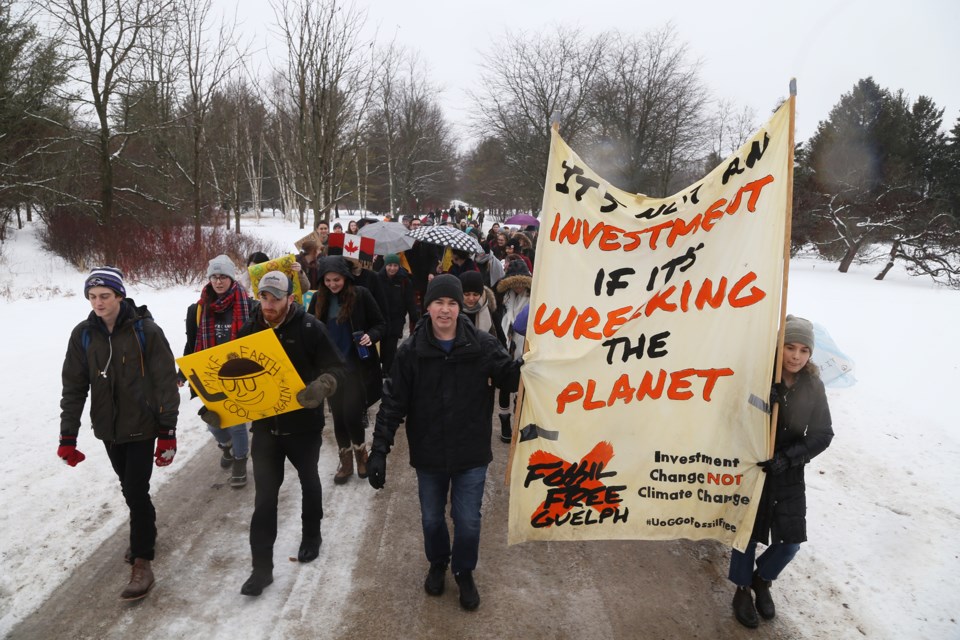The University of Guelph will move to reduce the carbon footprint of its endowment fund portfolio by 10 per cent within two years, but a student group that wanted to see a total divestment from fossil fuel companies says U of G is doing the bare minimum in the face of climate change.
Through the process of looking at possible divestment, the university now knows a baseline carbon footprint for the approximately 540 companies it invests in, said Don O’Leary, U of G’s vice-president of finance, administration and risk.
“We are taking that number as of December 31 (2018) and we want that to be reduced by 10 per cent. It has nothing to do with money, it has to do with the amount of carbon they are putting in the atmosphere,” O’Leary told local media after the decision.
A reduction of 10 per cent is significant and will amount to an estimated 17 tonnes of CO2 per million dollars invested, said O’Leary.
Eighty per cent of the university’s General Endowment Fund is designated for student assistance, like scholarships and bursaries. O’Leary said divesting from its approximately $30-million stake in fossil fuel companies would have an effect on them.
“We are looking for a return on investment here,” said O’Leary. “It does pay for endowments, it does pay for scholarships. We can’t forget that is another dynamic that is at play in this process.”
The university may not have to make any changes to its portfolio to reach the two-year target if the companies it invests in reduce carbon emissions by the 10 per cent target on their own in that time period, O’Leary acknowledged.
The decision to seek the 10 per cent reduction was approved unanimously at the university’s Board of Governors meeting held Wednesday at the Arboretum Centre.
About 100 members and supporters of Fossil Free Guelph walked with protest signs from University Centre to the Arboretum Centre to attend the meeting.
Fossil Free Guelph is a mostly student-run group which wishes to see the university divest from fossil fuel companies entirely over a five-year period.
The board did not consider total divestment during the meeting, only the 10 per cent plan that was put forward by its finance subcommittee and an ad hoc committee on special action requests.
The plan includes the development of new investment goals, which will use responsible investing and environmental social and governance (ESG) criteria.
“We believe that engagement and becoming an active shareholder — taking them to task, being in their face in terms of what they are doing, challenging them, partnership with other universities — can have more of an effect than simply divesting and leaving them to someone else,” said O’Leary.
Megan Peres, a fourth year student and member of Fossil Free Guelph told the board on Wednesday that it is doing the absolute minimum by choosing to do the 10 per cent reduction over two years instead of total divestment.
Speaking with media after the vote, Peres said the result is not what the group wanted, but it will continue to press the university for total divestment.
“This climate action movement is picking up all across the world and we are going to continue to be a part of it and hopefully the university of Guelph will get on board with it at some point,” said Peres.
The 10 per cent reduction can be counted as a small win, acknowledged Peres. She said the university only looked in to its options because of the pressure applied by Fossil Free Guelph.
“Without the action of Fossil Free Guelph and all of the students that have pushed them to this point — the platform (the university) is working on right now wasn’t even on their radar before us, so that is definitely a win,” said Peres.
First year student Aidan Brushett said the 10 per cent plan would have been a good first step, if it had been introduced 10 years ago.
The plan to reduce the carbon footprint of the companies it invests in is admirable, said Brushett, but
“When we talk about divestment — it’s a huge climate change issue, but it’s also an economic issue, it’s a human rights issue — there’s so many Indigenous communities that are currently being trampled over by fossil fuel companies and that is something that can’t be reconciled by engaging in these companies,” said Brushett.
O’Leary told the media that the reductions may not necessarily target the fossil fuel industry.
“There are bigger polluters from a carbon footprint perspective than oil companies, for sure. Those would be the ones we would look at right off the bat before we start looking at some of the oil companies,” said O’Leary.
The university does not invest in the arms industry and its investment in tobacco companies is less than $1 million, said O’Leary.
